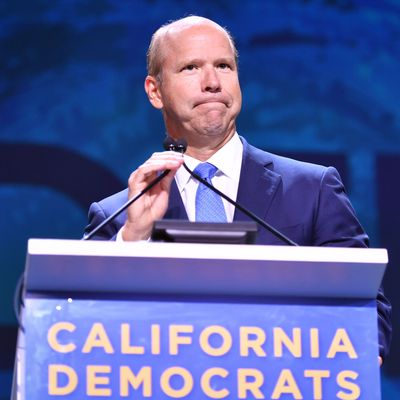
John Delaney wants to talk, but nobody seems to want to listen. The congressman from Maryland has been running for president for nearly two years, and polls somewhere around one percent. On Sunday, then, he must have felt a small hope dawn: He was trending on Twitter, at last. But his brush with fame probably wasn’t what he’d hoped it would be when he first launched his campaign. Delaney made the news because he got booed at the California Democratic convention. “Medicare for All may sound good, but it’s actually not good policy, nor is it good politics,” he told a resistant audience.
“We should have universal health care, but it shouldn’t be the kind of health care that kicks 150 million Americans off their health care,” Delaney continued, per CNN. “That’s not smart policy. I want everyone to have health care, but it’s got to be a plan that works for every American.”
Delaney’s characterization of Medicare for All legislation isn’t quite accurate; though its current iterations do abolish private insurance, it’s to move Americans onto a public, single-payer health-care plan that guarantees them coverage. People don’t lose their care so much as they exchange one plan for another, more secure alternative. Delaney, then, didn’t just speak like a moderate who disagrees with nationalized medicine for ideological reasons but like a moderate who’s paid little attention to the moral and political arguments that the policy’s advocates have advanced in its favor. The booing was no surprise.
Neither was the reaction of Representative Alexandria Ocasio-Cortez, a democratic socialist who supports Medicare for All. In a tweet that quoted RuPaul’s Drag Race, Ocasio-Cortez urged the candidate to “sashay away.”
Delaney wasn’t amused, either by Ocasio-Cortez or by his Democratic hecklers. On his own Twitter account, the congressman asked his colleague for a debate — a request she declined.
Delaney’s reaction looks incoherent at first — does he want a debate, or does he want his party to stop quarreling in public? — but it’s not so difficult to decipher his goal. He wants a conversation on his terms. His ability to convince voters that he is not three Eric Swalwells stacked inside a trench coat depends on increased visibility. A debate with one of the most famous women in American politics would deliver just that.
In a limited sense, his gambit succeeded. Here I am writing about him for the first time in his two-year-old campaign. But his moment in the sun might be tragically brief. It is generally advisable to stick to debates you can win. Delaney’s health-care vision, in contrast to Medicare for All, looks somewhat muddled. The candidate says he supports universal health care, and that different paths can take Democrats to the same location. On closer inspection, though, it doesn’t seem like Delaney and Democrats like Ocasio-Cortez want to end up in the same place at all. Delaney’s plan would keep private insurance intact and allow employers and individuals to purchase insurance to supplement the government-run plan. When asked directly by Vox’s Dylan Scott why his plan would let some people have more robust coverage than others, Delaney answered:
I think it depends how you measure success. I measure success by everyone in this country having access to quality health care. Does that mean every single person in the country has to have access to quality health care from always the same provider in always the same ways? No. But they have to have access to quality health care as a basic right.
That doesn’t really answer the core question: If you think that access to health care should be a basic right, why tolerate any inequality at all?
Delaney could learn something, though, from Ocasio-Cortez. Her career demonstrates a lesson he’s keen to prove as well — that an underdog candidate can achieve unexpected success. But Delaney is no Ocasio-Cortez, for many reasons. He already held public office and hasn’t distinguished himself on the national stage. And the success of any underdog campaign depends largely on the candidate’s platform and image. Ocasio-Cortez promised the people of her district sweeping political reform. Not only did her policies, shaped by a commitment to democratic socialism, resonate with voters; she ran an effective canvassing operation that put her consistently in front of voters. She was somebody they knew; somebody they felt they understood; somebody they felt might be a more reliable advocate than Joe Crowley.
Ocasio-Cortez won, in summary, because she understood the power of mass politics. She organized and convinced voters that she had their interests at heart. Delaney, meanwhile, wants her to take time away from trying to help pass legislation in order to debate him. That doesn’t benefit Ocasio-Cortez, and it doesn’t benefit her constituents, who elected her to work for them. But Delaney’s request may make his motivations for running a bit more obvious. Barring miraculous intervention, Delaney won’t be president. He may, however, be a bit more famous than he used to be, an outcome that has little to do with serving the common good.






























